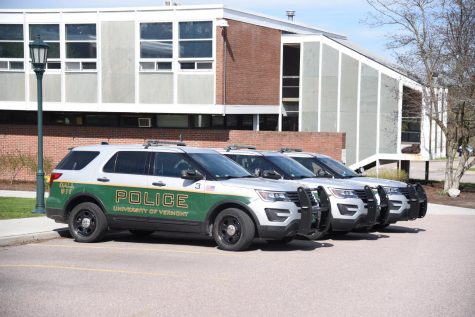Scammers target UVM students again
Photo Illustration by STEPHAN TOLJAN/The Vermont Cynic
A student views a Nov. 6 UVM Police Services email warning about scams. UVM students have been the target of email and phone scams since the school year began.
UVM Police Services struggles to combat increasing phone and email scams that target students, despite admitting they don’t have the answers.
The UVM community received an email from UVM Police Nov. 6 warning about ongoing phone and email scams that pretend to be UVM Police or Burlington Police asking for money or credentials.
This is the second email of its kind this semester and the fourth in 2019.
Acting Police Chief Tim Bilodeau said that the rising phone and email scams are difficult for the police to address, partially because scam phone calls usually come from outside the country.
“It would be great if there was a way that we could reduce this, but I don’t have the answers to that,” he said. “I don’t see it happening right now.”
UVM’s Information Security Office, a branch of the information technology department, works to combat email scams that attempt to get student credentials like NetID and password, a type of fraud known as phishing.
Sam Hooker, an information security engineer in the IT department, said the only real way to combat phishing is when the recipients are paying attention and are aware of what may be a scam.
“The challenge of course is that the people who are trying to phish us are very clever and often can out-clever machines,” he said. “So the algorithms that are trying to spot phish are not perfect and things still get through.”
Information Security filters UVM emails to stop scams from reaching students. In a seven-day period, UVM received over 3.4 million emails, more than half of which were blocked or flagged by IS.
Junior Katie Cartwright works at the Vermont Consumer Assistance Program, an organization that mediates consumer reports and tracks scam trends.
Cartwright said the majority of the calls she gets are from people reporting scams and that the number of scam reports is always increasing because scammers are becoming more and more creative.
“I think the scams play on the fact that students are always stressed,” Cartwright said.
The number of scams have been consistent over the last several years, but scams will typically pick up around stressful times in the year for students, like exams or move-in time, Hooker said.
“They’re leveraging a social attack, so they’re trying to play on people being busy or anxious,” Hooker said. “That’s why they attack at those times.”
When asked if she sees UVM Police’s email notifications about scamming as helpful, Cartwright said that it’s the only thing that the police can do in response to these scams.
“It’s because [UVM] can’t do anything about it,” she said. “It’s great that they’re telling us about the scams, but it’s literally the only thing they can do.”
Cartwright said that when people call the Consumer Assistance Program about scams the only thing she can do is log it.
“There’s nothing that can really be done,” she said. “We can’t take them to court, we can’t call them back. All we can tell people is to block the number that called, but then it’s probably just going to come from a different number next time.”
Cartwright said scamming is not right and dangerous.
“It’s really messed up,” she said.

Emma Pinezich is a senior Political Science and French double major from New York. She started working for the Cynic as an illustrator in her first year...












